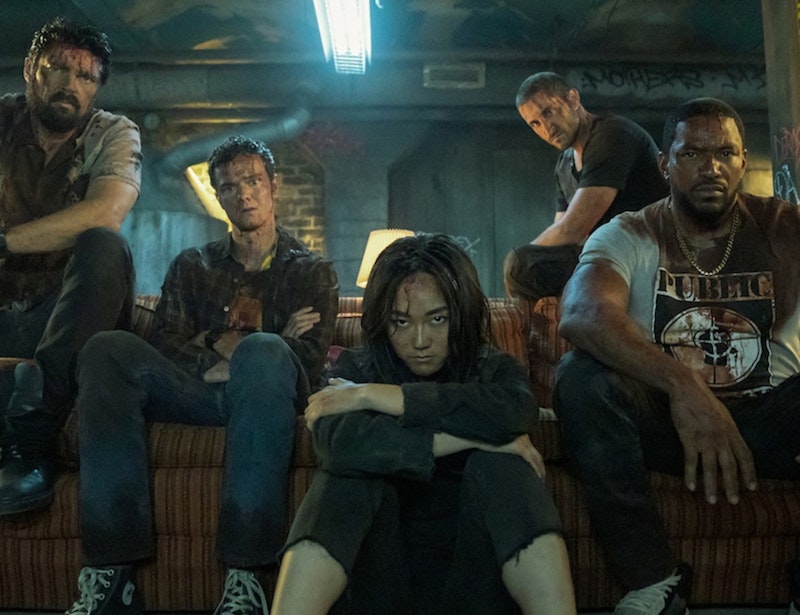Gen V is a new Amazon show that further explores the fantasy of the super-powered. We’re awash in these shows now, partly because the catalogue of comic book superhero characters produced since the 1940s, 1950s, and 1960s, are easily mined for plots and characters for today’s movies, television, and streaming platforms.
Lately our superhero fantasies have been about super-females. Lots of people identify the pivot point for this as Joss Whedon’s Buffy, The Vampire Slayer, in which a teenage girl imbued with superhuman strength and other powers (in a spell cast by African witch doctors millenia ago) battles demonic forces. Buffy has since given birth to many similar fantasies, including: the Sookie Stackhouse novels of Charlaine Harris (a young telepathic waitress navigates a world of vampires and other creatures in rural Louisiana), then televised as the HBO series TrueBlood; the Patricia Briggs novels featuring Mercy Thompson, a Native-American shapeshifter, who crafts diplomacy in a world of werewolves in the Pacific northwest; Kim Harrison, whose witch character Rachel Morgan is a detective in a post-apocalyptic Ohio, where some bad GMO horticulture has wiped out most of the human race, and pixies, fairies, banshees and other monsters have come out of the closet to keep civilization from collapsing.
There’s no end to this genre of super girls and women, which often has a distinctly feminist edge. Marvel produced the somewhat noir series Jessica Jones, about a hard-drinking female PI with superpowers. This year Amazon streamed The Power, starring Toni Collette, based on a 2016 Naomi Alderman novel of the same name, depicting a world in which people without a Y chromosome develop an organ along their breastbone that allows them to generate electricity, like an eel. The result is a toppling of governments and male power structures.
Whedon biographer Amy Pascale repeats the view that Whedon—now cancelled by the #MeToo movement—started this, with his idea of taking the common Little Red Riding Hood plot in which a young girl is stalked or attacked by a monster, and asking “What if the girl fought back and won?” A plot which probably requires, given superior male strength, size, heart and lung capacity, and bone density, that the girl have super powers. (Or alternatively at least martial arts training, as in the recent retelling of “The Three Little Pigs,” where the pigs’ ninja sister saves them.)
I disagree with this Whedon hagiography—even though I am a fan of these novels and of Whedon’s supergirl shows, from Buffy to Agents of Shield to The Nevers. Buffy may have been infused by shamans with powers stolen from a demon, but that was in the 1990s. In 1985, when little Joss Whedon had just left high school in the U.K. to attend college at Wesleyan University, British novelist Fay Weldon published The Life and Loves of a She Devil.
British (Irish, American) fiction has a long tradition of depicting young women in distress—orphaned, poor, inexperienced—surrounded by dangerous forces. Without superpowers, and before women could have careers outside the home, they had to count on an inheritance, a good marriage, or a sudden discovery of their aristocratic or royal birth. Jane Austen’s Dashwood sisters in Sense and Sensibility are at the mercy of what a man will leave them in his will or whether a man will take them as his wife. Fifty years later J. Sheridan Le Fanu’s Uncle Silas (1864) tells a tale in which a variety of people plot to murder and seize the fortune of 17-year-old Maud Ruthyn. By 1945 Irish writer Josephine Leslie penned The Ghost and Mrs. Muir, in which the titular widow manages to resist the coercion of relatives about how she should live and raise her children, but only with the aid of the ghost. Fay Weldon reversed this with a female character claiming her own life, albeit by tapping into devilish powers.
Back to Gen V, which is a spin-off of an existing Amazon series, The Boys. The Boys inverts the super hero maxim that “with great power comes great responsibility.” The superheroes of The Boys are deranged, sometimes rapists or murderers, all produced and managed by Vought Inc., a multinational whose pharmaceutical division has made a potion that when given to children gives them superpowers. The corporation and its media division manage the ensuing bloodshed to protect their bottom line.
Gen V however, is about twenty-something mutants at a college just for supes. Wokeness and “progressivism” is skewered. Vought manipulates imagery related to “diversity, equity, and inclusion,” though behind the scenes the callousness and hypocrisy of its PR and media people is mined for comedy. Some of the men, as in The Boys, use their powers to commit sexual assaults (or just suggest that fans give them blow jobs); a character named Rufus telepathically roofies girls to have his way with them.
In all this a group of mainly female undergraduates are discovering that Vought, which sponsors the supe university, has an underground asylum where it’s incarcerating supes it finds inconvenient.
Eric Kripke, from Supernatural, the buddy/bro team competitor to Buffy, is a writer/showrunner. Perhaps that’s why there seems to be a parody of the Buffy/Whedon girl power “tradition.” The Gen V girls all have superpowers related to current fads in female self-harm: one can shrink like Ant-Man or grow to be a giantess (like Alice in Wonderland), by purging or overeating; one cuts herself and then can manipulate her blood (and other people’s) telekinetically as a weapon that binds or slashes her victims; another is truly transgender, like the characters in Ursula K. Le Guin’s The Left Hand of Darkness (1969), able to shift back and forth from a male to a female body.
Gen V has a new episode each week. It’s every bit as good as The Boys and the other similar fantasy fare now streaming everywhere, but with the added attraction of poking fun at Hollywood political correctness.

